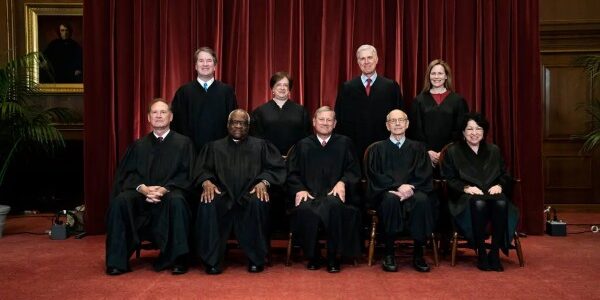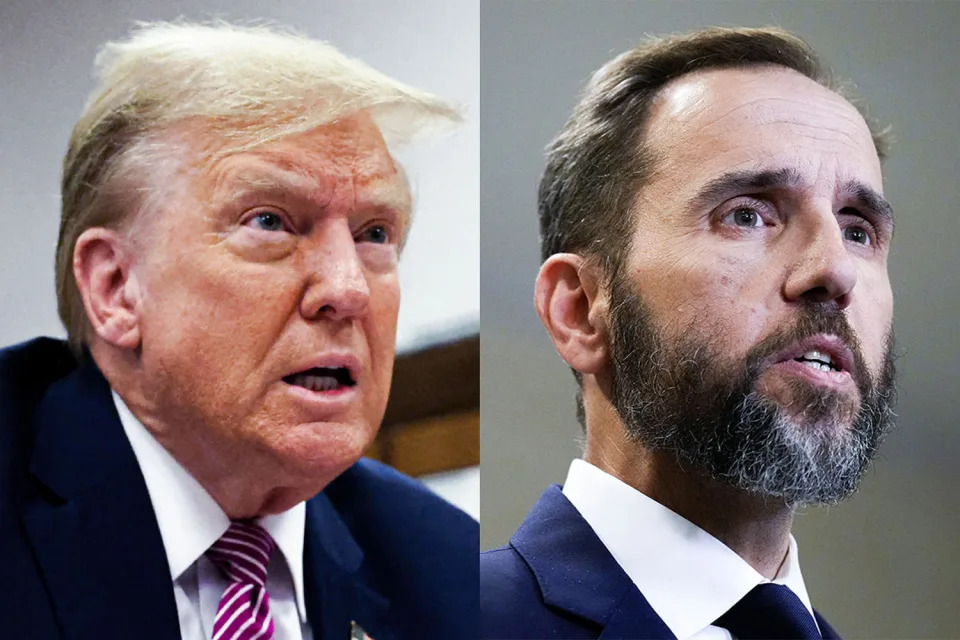
WASHINGTON — The Supreme Court on Monday raised the bar for prosecuting Donald Trump, ruling that he has immunity for some of his conduct as president in his federal election interference case but maybe not for other actions, adding another obstacle for special counsel Jack Smith’s taking the case to trial.
In a novel and potentially consequential case about the limits of presidential power, the justices voted 6-3 along ideological lines to reject Trump’s broad claim of immunity, meaning the charges related to his attempts to overturn the 2020 election results will not be dismissed, but they said some actions closely related to his core duties as president are off-limits to prosecutors.

“Big win for our Constitution and democracy. Proud to be an American,” Trump said in a post in all capital letters on his social media website, Truth Social.
Trump’s Republican allies welcomed the ruling, while Democrats roundly condemned it. In televised remarks from the White House on Monday night, President Joe Biden called the decision “a terrible disservice to the people of this nation.”

“No one, no one is above the law, not even the president of the United States. [With] today’s Supreme Court decision on presidential immunity, that fundamentally changed for all practical purposes,” Biden said.

Chief Justice John Roberts, writing for the majority, said further proceedings are needed in lower courts to determine what conduct Trump can be prosecuted for. Among the conduct that the court determined to be core presidential powers and therefore subject to immunity are Trump’s contacts with Justice Department officials. Trump is also “presumptively immune” from being prosecuted for his contacts with Vice President Mike Pence in the weeks leading up to the Jan. 6, 2021, attack on the Capitol by his supporters, Roberts wrote.
The indictment alleged that Trump sought to pressure the Justice Department to investigate unfounded claims of widespread election fraud as part of a plan to keep him in power despite Biden’s election victory. Trump also wanted Pence to refuse to certify the election results as part of his ceremonial role at the joint session of Congress on Jan. 6.
“The President is not above the law,” Roberts wrote. “But Congress may not criminalize the President’s conduct in carrying out the responsibilities of the Executive Branch under the Constitution.”
What that means for the case going forward remains to be seen. Trump’s lawyer conceded in the oral argument in April that at least some of the allegations in the indictment concern private conduct that would not be protected by any immunity defense. Likewise, the Justice Department lawyer arguing the case for the special counsel said the prosecution could go ahead even if some official acts were protected.
Smith’s office declined to comment on the ruling Monday.
At a minimum, there will be further proceedings before U.S. District Judge Tanya Chutkan to determine what, if any, of the other conduct alleged in the indictment is protected. Among the acts she will review to determine whether they are subject to immunity are Trump’s contacts with people outside the federal government, including state election officials such as Georgia Secretary of State Brad Raffensperger, whom Trump pressured to reject results showing Biden victories.
Prosecutors will also have a chance to rebut the suggestion that Trump’s contacts with Pence are protected. That determination would hinge on whether prosecuting Trump for those actions would “pose any dangers of intrusion on the authority and functions of the executive branch,” Roberts wrote.
In addressing the contacts with state election officials, Roberts wrote that the president has “broad power to speak on matters of public concern,” including the conduct of elections. On the other hand, the president “plays no role” in the certifying of elections by states, he added. Chutkan needs to conduct a “close analysis” of the indictment to determine whether Trump’s actions are protected, Roberts said.
In another blow to Smith, the court ruled that none of the conduct for which Trump is immune can be admitted as evidence at trial in any form.
The court’s three liberal justices strenuously dissented, with Justice Sonia Sotomayor writing that the ruling “makes a mockery of the principle, foundational to our Constitution and system of Government, that no man is above the law.”
The Constitution, she added, “does not shield a former President from answering for criminal and treasonous acts.”
She warned that the ruling could have broad ramifications by protecting presidents for a wide variety of actions.
“Let the President violate the law, let him exploit the trappings of office for personal gain, let him use his official power for evil ends,” Sotomayor wrote. “Because if he knew that he may one day face liability for breaking the law, he might not be as bold and fearless as we would like him to be. That is the majority’s message today.”
In a separate dissenting opinion, Justice Ketanji Brown Jackson described the ruling as a “five-alarm fire that threatens to consume democratic self-governance.”
Even if the new proceedings do not take much time, there is little chance for the trial to conclude before Election Day. It had previously been suggested that a trial would not start until at least three months after the Supreme Court ruling, which would mean it would potentially not start until early October at the earliest. The trial itself could last up to 12 weeks.
The case put the national spotlight on the court, which has a 6-3 conservative majority that includes three justices Trump appointed. The court handed Trump an election-year boost when it ruled in March that Colorado could not kick him off the ballot.
The justices were also criticized for their delay in taking up Trump’s appeal, which some view in itself as a victory for him, as it meant the trial could not take place in March as originally planned.
Legally speaking, the case was unprecedented, as no president has ever been prosecuted after having left office. Therefore, the court was wrestling with a legal question that had never come before it: whether a president has some form of immunity for his core duties derived from the constitutional principle of separation of powers, which delineates the powers of the presidency in relation to other branches of government.
The legal argument focused on Trump’s official acts, with both sides agreeing that a former president does not have immunity for personal conduct.
The Supreme Court intervened after a federal appeals court had ruled Feb. 6 that Trump was not immune from prosecution, saying that once he left office he became “citizen Trump” and should be treated like any other criminal defendant. The Justice Department has long maintained that a sitting president cannot be prosecuted.
The appeals court did not analyze which, if any, of the conduct in the indictment could be viewed as an official act, a fact that appeared to irk some of the justices during oral argument.
Trump’s lawyers pointed to a 1982 Supreme Court ruling that endorsed presidential immunity from civil lawsuits when the underlying conduct concerns actions within the “outer perimeter” of the president’s official responsibilities.
Smith’s team argued that there is no broad immunity that prevents former presidents from being prosecuted for criminal acts committed in office.
The federal indictment returned by a grand jury in Washington in August consisted of four counts: conspiracy to defraud the United States, conspiracy to obstruct an official proceeding, obstruction of and attempt to obstruct an official proceeding, and conspiracy against rights, specifically the right to vote.
In another Jan. 6-related case, the court on Friday narrowed the scope of law penalizing the obstruction of an official proceeding. Trump also faces that charge, but legal experts say the Friday ruling may not affect his case.
Trump, the indictment said, conspired to “overturn the legitimate results of the 2020 presidential election by using knowingly false claims of election fraud to obstruct the government function by which those results are collected, counted and certified.”
The indictment focuses on Trump’s involvement in a scheme to submit fake election certificates to Congress in the hope that they would nullify Biden’s victory. The chain of events culminated in the riot at the U.S. Capitol on Jan. 6.
Trump, who pleaded not guilty, says he was simply expressing his concerns, which were not based on any evidence, that the election was marred by widespread fraud. The case is one of four criminal prosecutions Trump is currently battling.
Credit: Yahoo News
